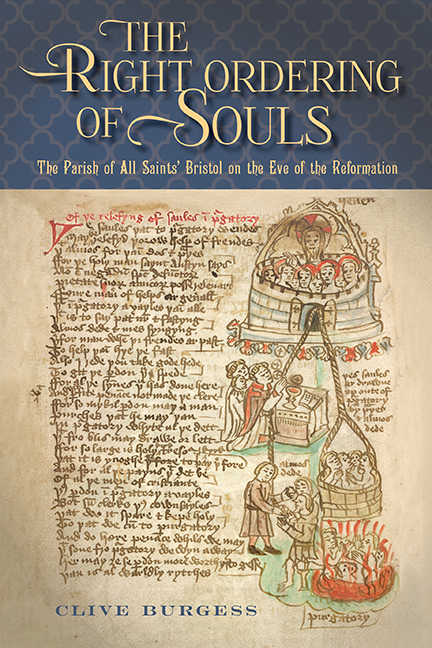Book contents
- Frontmatter
- Dedication
- Contents
- List of illustrations
- Acknowledgements
- Miscellaneous Frontmatter
- Abbreviations
- Notes
- map
- Part I For the increase of the divine service
- Part II All Saints’, Bristol, and its parishioners
- Part III Commemorating the dead
- Part IV Leaders and administrators
- Part V Ordering the parish
- Appendices
- Bibliography
- Glossary
- Index
- Miscellaneous Endmatter
Part I - For the increase of the divine service
Published online by Cambridge University Press: 05 May 2018
- Frontmatter
- Dedication
- Contents
- List of illustrations
- Acknowledgements
- Miscellaneous Frontmatter
- Abbreviations
- Notes
- map
- Part I For the increase of the divine service
- Part II All Saints’, Bristol, and its parishioners
- Part III Commemorating the dead
- Part IV Leaders and administrators
- Part V Ordering the parish
- Appendices
- Bibliography
- Glossary
- Index
- Miscellaneous Endmatter
Summary
SHIFTING opinion in recent decades has unsettled orthodoxies on the late medieval English Church, so much so that many now agree that Catholicism flourished in this country in the two centuries prior to the Reformation. Indeed, the premise underpinning the present study is that religion in the later fourteenth, fifteenth and early sixteenth centuries benefited from an institutional vitality and popular commitment rarely, if ever, equalled since. To take one indicator, in every locality of England many parish churches were either lavishly rebuilt or substantially enlarged in the two centuries that followed the Black Death, a period when a much reduced population remained stubbornly low. Moreover, many of the Church's longest functioning and most prestigious regular corporations, namely its monasteries and hospitals, revived and prospered despite enduring calamitous manpower losses with the onset of plague. The same applies to England's secular, or collegiate, corporations, which, if anything, began to enjoy a new lease of life from the later fourteenth century. Similarly, ‘voluntary’ religion, as expressed either in parish fraternities or local chapelries, also inspired keen commitment. And, even though this study is mainly concerned with institutional development within the Church, a lively tradition of affective piety further enriched the spiritual experience of many among the faithful in the period in question.
Such claims would once have been unexpected and, in some quarters, may still be contentious; but this merely testifies to obstacles that long impeded the satisfactory evaluation of the pre-Reformation English Church. The conceptual chasm between late medievalists and early modernists, when coupled with the relative scarcity of those studying the earlier period and also a residual denominational antagonism, meant that few paid much heed to religious practice as observed before the destruction unleashed in and after the 1530s. In general, historians of the Reformation displayed little inclination to explore conditions antecedent to ‘the main event’ and, indeed, an inadequate grasp of the Catholic establishment and its mores still hinders assessments either of immediate or of eventual change. Even the most influential across-the-divide survey, which manifestly places a premium on conditions before the Reformation statutes, has failed to resolve this problem – as if any one study could.
- Type
- Chapter
- Information
- 'The Right Ordering of Souls'The Parish of All Saints’ Bristol on the Eve of the Reformation, pp. 1 - 4Publisher: Boydell & BrewerPrint publication year: 2018

